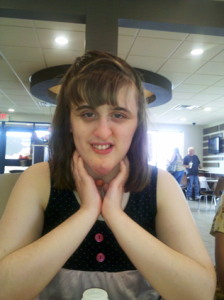
Photo by Rebecca Faye Smith Galli
This column was originally published as part of my “Tuesdays with Madison” series at AutismAfter16.com.
I was ready for the meeting, but still felt unprepared.
We were to discuss a change in programming for Madison—that part was nothing new. But it could be a program, perhaps the program that would stay with her for the rest of her life: her adult services program.
In March, my Madison turned 21, that magical age for most where they are considered an adult with some highly celebrated privileges. But for those with special needs, that age is the gateway into a world most haven’t experienced since a very young age—a world without educational supports.
Madison has been in programming since she was 12 months old. She tested 25 percent delayed in a local Infants and Toddlers Program and started receiving services both in our home and in a nearby specialized school. I can’t remember a time when there weren’t goals and objectives for her with highly-skilled therapists and teachers trained in how to bring out the knowledge hidden behind the autism and behaviors.
But now, it was time for Madison to move from school to vocation, from an Individualized Education Plan (IEP) to an Individualized Service Plan (ISP).
We’d been planning for this day since she was 14. We knew she had limited academic potential, so early on we began identifying vocational skills that she could develop. She knows her numbers, shapes, colors, and can follow simple instructions, so sorting became a viable goal. She still has trouble with counting, though, and skips those apparently tricky numbers, 16 and 17, from time to time. She can put lids on small containers and take them off, but someone will need to double check the final count. Still doesn’t quite have the “how many” question perfected.
But she tries. And with prompting and supervision, she succeeds most of the time.
The adult services director showed me the schedule for the day. “It’s very different,” she began. “The pace is slower with fewer demands.”
I wondered if that could be a good thing for Madison since the academic demands often brought on behavioral upsets.
She explained to me that Madison is a pioneer of sorts, the first new student to be accepted into their long-standing adult program that traditionally served more involved adults, many nonverbal with significantly lower skills than Madison.
I listened to the director speak about the program, their plans for expansion, and the other adults in the current program. I tried to envision my Madison in that classroom and its new routines.
No speech services. No occupational services. And large chunks of the day for vocational and life skills.
But it was the tone of the director’s voice that spoke the most to me.
Ever the realist, she noted that Madison would be the highest functioning in this inaugural group of transitioning adults. “We will make every effort to make sure that she continues to develop as much as she can.”
“Will she still go on outings?” Madison loves “going,” whether to the mall, movies, or out to Wal-Mart or Target. I wouldn’t want her to lose that confidence and flexibility.
“Absolutely,” she said, and then described some of the outings the group would attend. And then she paused and added, “In my opinion, education is not a place, it’s an experience.”
Her words hung in the air as I let the meaning seep in. She was right. Whether governed by an IEP or an ISP, education is the business of living, the experiences we have. It’s the business of continuing to learn no matter what your ability or disability.
Madison will learn from her new peers in this adult services program as I am sure they will learn from her. And with the steadfast commitment to learning through experience and seeking those opportunities, I am finally prepared to be a pioneer with my daughter.
Again.
Follow Me!